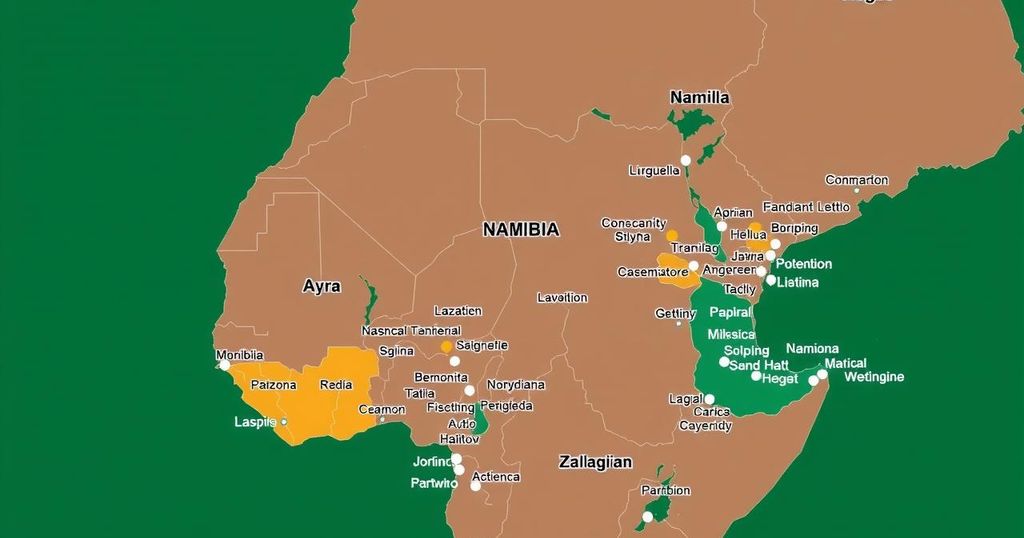World news
AFRICA, AFRICAN NATIONAL CONGRESS, BOTSWANA DEMOCRATIC PARTY, DEMOCRACY, FRELIMO, GOVERNANCE, GOVERNMENT, JOHANNESBURG, JOHN ELIGON, LIBERATION PARTY, MOZAMBIQUE, NAMIBIA, OPPOSITION, OSCAR VAN HEERDEN, PARLIAMENTARY SEATS, POLITICS, SOUTH AFRICA, SOUTH WEST AFRICA PEOPLE ’ S ORGANIZATION, TIM, TIMO SHIHEPO, WINDHOEK
Stella Nguyen
0 Comments
Namibia’s Upcoming Election: A Crucial Test for SWAPO and Voter Sentiment
Namibia’s SWAPO faces a pivotal electoral test as voters head to the polls, amidst a backdrop of high unemployment and social discontent. With over 40% of registered voters under 35, the youth demographic plays a critical role. The election could result in either the country’s first female president or a significant opposition breakthrough. Recent regional trends indicate traditional liberation parties may be losing voter support.
On Wednesday, the South West Africa People’s Organization (SWAPO) of Namibia will face a critical electoral challenge as voters head to the polls. This election serves as a significant litmus test for the party, which has governed since Namibia’s independence in 1990. A combination of issues such as high unemployment rates, government corruption, a housing deficit, and deteriorating social conditions have diminished SWAPO’s popularity. The current political climate is reflective of broader trends in southern Africa, where traditional liberation parties have seen a decline in voter support.
Recent elections in the region have highlighted a shift in citizen sentiment. For instance, the African National Congress (ANC) in South Africa recently lost its absolute parliamentary majority for the first time in three decades, leading to a governing coalition. Meanwhile, Botswana’s Democratic Party faced a notable defeat, transitioning from the largest to the smallest party in Parliament. Although Frelimo in Mozambique was declared the election winner, allegations of electoral manipulation have caused widespread discontent among citizens.
One notable factor influencing this election is the emerging youth demographic, which constitutes over 40 percent of Namibia’s 1.4 million registered voters. Young voters are increasingly disinterested in past glories and prefer addressing contemporary issues such as employment and economic stability. Despite efforts by SWAPO, including hiring popular musicians for campaign rallies and selecting younger candidates, analysts warn that younger voters are less likely to translate registration into actual votes.
Furthermore, economic hardships in Namibia are becoming increasingly pronounced. Many citizens who once embraced liberation nostalgia are questioning the lack of tangible improvements in their lives. Major issues such as a severe housing backlog and alarming unemployment levels—estimated at one-third of the population—are fueling public dissatisfaction.
The electoral race features 14 opposition candidates, which might dilute votes in SWAPO’s favor. Panduleni Itula, who previously secured approximately 30 percent of the vote as a former SWAPO member, has formed a new party but may still draw some support back to SWAPO. Meanwhile, SWAPO has been conducting rally campaigns in its traditional strongholds, aiding its bid to retain influence.
Regardless of the outcome, the election will mark a notable milestone, potentially resulting in Namibia’s first female president, Netumbo Nandi-Ndaitwah, or allowing an opposition figure to win. If no candidate receives over 50 percent of the votes, a runoff election will ensue, unprecedented in Namibia’s electoral history.
The results are anticipated within five days, with implications that extend beyond national borders as Africa witnesses a consequential reshaping of its political landscape.
This election is part of a broader trend across southern Africa, where liberation parties, once the heralds of independence from colonial rule, are experiencing significant voter backlash. Economic challenges, systemic corruption, and social issues have led to a questioning of past leadership by a younger generation with different priorities. The demographic shifts in voter registration highlight a potential realignment in political allegiance, urging parties to adapt their messaging and strategies in order to retain electoral support. Namibia specifically presents a unique case with its historical context and current governance under SWAPO, reflecting the tensions between legacy and present-day discontent.
In summary, Namibia’s upcoming election is poised to be a pivotal moment for SWAPO and the country’s political future. The rise of younger voters, economic difficulties, and a crowded opposition landscape present both challenges and opportunities. Whether SWAPO can sustain its long-held dominance amidst these pressures remains uncertain. This electoral event will not only shape Namibia’s domestic policies but could also influence the trajectory of liberation parties throughout southern Africa.
Original Source: www.nytimes.com




Post Comment